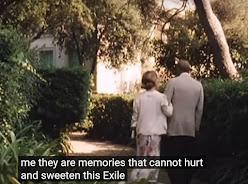Rebecca is a great mystery. It is even a great Gothic novel.
Is it romantic?
*Spoilers*
Although the wooing of the unnamed bride--I will call her JF for Joan Fontaine--is quite romantic, a classic rescue of a harassed innocent by an older man, the reason for the marriage is never entirely clarified. Maxim, the angsty, grouchy groom, seems to be clinging to JF's youth and a need for companionship. As the book and 1940 film capture, after the whirlwind marriage, JF has difficulty fitting into a social class that is slightly above her own.
The great emotional climax, of course, is when Maxim confesses that he killed Rebecca, his loathsome previous wife, because he hated her. And JF is thrilled. The passage in the book is wonderfully single-minded. She doesn't care about the murder, only, "He had never loved her--never!"
Except...he IS entirely obsessed with his dead wife. Not just because he inadvertently murdered her. He is obsessed because he can't shake how far he was deceived, how much he was mistreated, how much he feared people discovering what she was truly like. He is so obsessed with his past that when his current wife appears in the same costume as his dead wife, he gets all wigged out and snaps at her.Good grief, Rochester has a crazy wife locked in the attic, and he is less obsessed than Maxim! One gets the feeling that if Jane Eyre showed up in the crazy wife's costume, he would say, "Hey, looks better on you than on her--way to go!"
It's the constant hand-wringing that calls JF and Maxim's relationship into question. It's like going on an initial date with a guy who wants to tell you all about his ex-girlfriends or all about his past relationship trauma (both experiences that I've had). And the thought occurs, Uh, I don't think you are really over any of that, and I don't really want to be dragged into it. Being in passionate love and being angrily obsessed may be different in intention. They are remarkably similar in behavior.
[Maxim] never complains, not even when he remembers...which happens, I think, rather more often than he would have me know. The devil does not ride us any more. Of course, we have our moments of depression...but...I know we are together, we march in unison, no clash of thought or of opinion makes a barrier between us...boredom is a pleasing antidote to fear. I have learnt my lesson [not to read items aloud that will evoke the past]. We never speak of Manderley.
She has grown up. She and Maxim will manage. That's good enough. But the image of JF having to endlessly "handle" her husband--a life in which she can never truly relax, never leave the past alone or discuss it directly, always guard her words and her thoughts (whatever she claims), constantly read her husband's emotional state as she fulfills the role of therapeutic helpmeet--fills me with bone-deep weariness. Not a hint of romance.


